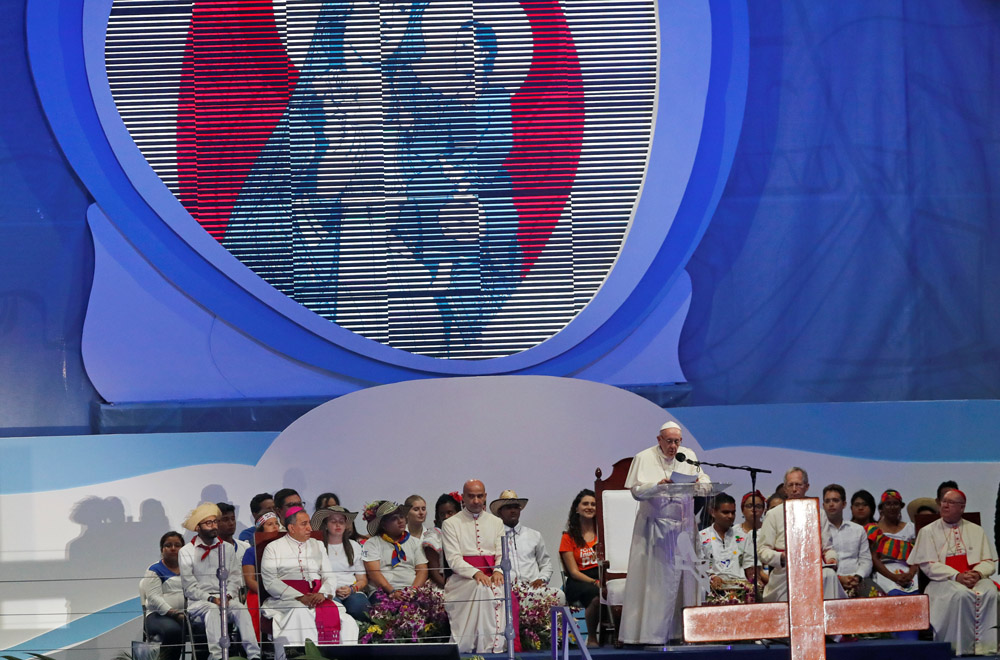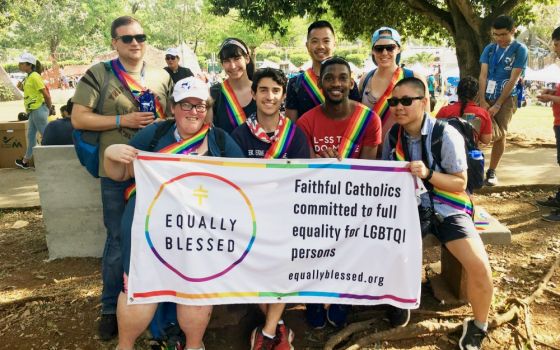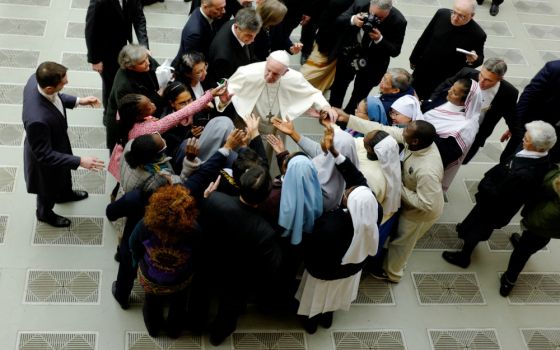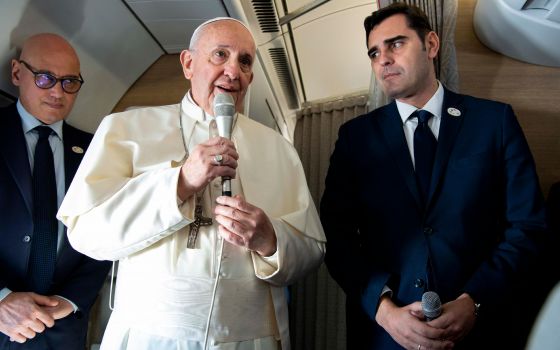
Pope Francis speaks as he leads World Youth Day pilgrims in the Way of the Cross at Santa Maria la Antigua Field in Panama City Jan. 25. (CNS photo/Carlos Jasso, Reuters)
Pope Francis lamented the "senseless and irresponsible condemnation" of migrants Jan. 25, telling hundreds of thousands of young people here that the Catholic Church should help create societies that welcome and protect those leaving their homelands due to violence or famine.
In a Via Crucis prayer service during World Youth Day marked by a mixture of poignant and pointed prayers, the pontiff asked that the global institution "learn how to welcome and take in all those abandoned and forced to leave or lose their land, their roots, their families, and their work."
"We want to be a church that fosters a culture that welcomes, protects, promotes and integrates," the pope told crowds packed along Panama City's Pacific shoreline for the service.
"[A church] that does not stigmatize, much less indulge in a senseless and irresponsible condemnation of every immigrant as a threat to society," Francis specified.
Francis is visiting Panama Jan. 23-27 for the triennial Catholic celebration.
The pope spoke at the end of the prayer service, during which groups of young pilgrims from various countries offered reflections that drew connections between Jesus' suffering during his crucifixion and modern day situations of adversity.
The list of issues touched was vast: a group from Guatemala focused on the "centuries' old pain" of indigenous peoples, a group from Costa Rica on the "enslaving" of creation through environmental destruction, and a group from Mexico on the "terrorism" of gang violence.
But the situation of migrants took a focus in both the pope's remarks and the young peoples' reflections.
At the sixth station of the cross — when Jesus is beaten and crowned with thorns — a group from Venezuela reflected on how Jesus "wanted us to find him in the pain of the migrants and in the anguish of the refugees."
"He himself was also a migrant as a child in Egypt; he, too, heard the same footsteps of those who yesterday and today brutally persecute those who not only have lost everything, but have also seen borders and doors being closed," said the Venezuelans.
"The borders are being crowned with sharp thorns that threaten, despise and reject so many brothers," they continued, before asking that God "let us know how to welcome you, who continue to walk the world in so many exiles, with love."
In his remarks at the end of the service, Francis likewise focused on a range of difficulties people face today, including mistreatment of women, drug addiction and human trafficking.
The pontiff also made a reference to clergy sexual abuse for the first time during his five-day visit to Panama. He noted that young people can "fall into the snares of unscrupulous people, including people who claim to be serving [the] Lord" and said those snares can include "exploitation, criminal activity and abuse."
Francis' five-day visit to Panama is focused almost entirely on World Youth Day.
But earlier on Jan. 25, the pontiff visited a juvenile detention center, where he encouraged the young prisoners to embrace the possibility of change by seeking out those who might help them make better decisions once they are released.
On Jan. 26, the pontiff is to celebrate Mass with priests and religious before taking part in an evening vigil with young people.
Advertisement
Francis' choice so far not to refer directly to clergy sexual abuse while in Panama has been notable. Despite his upcoming February summit on child protection with the world's bishop presidents, the pope did not mention the issue in a meeting with bishops from across Central America on Jan. 24.
In response to a question about that decision during a press briefing Jan. 25, Vatican spokesman Alessandro Gisotti said "it is not necessary" that the pope mention the issue in every speech he makes.
"It is normal that the Holy Father would speak on many subjects," said Gisotti. "It is not undermining his struggle to face this scourge."
[Joshua J. McElwee is NCR Vatican correspondent. His email address is jmcelwee@ncronline.org. Follow him on Twitter @joshjmac.]







